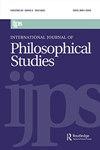约翰·麦克道尔2013年Agnes Cuming讲座“关于感知的两个问题”访谈
IF 0.6
3区 哲学
0 PHILOSOPHY
INTERNATIONAL JOURNAL OF PHILOSOPHICAL STUDIES
Pub Date : 2023-01-01
DOI:10.1080/09672559.2023.2204696
引用次数: 0
摘要
2013年,匹兹堡大学杰出大学哲学教授约翰·麦克道尔(John McDowell)在都柏林大学学院哲学学院每年举办的艾格尼丝·卡明讲座上发表了题为“关于感知的两个问题”的演讲(4月23日至24日)。以下是奥谢(O’shea) (https://youtu)对麦克道尔(JM)的采访。他的两个讲座的题目是:“认知科学能决定认识论吗?””(https://youtu。和《感官是沉默的吗?》”(https://youtu。/ fBQHEGg5JSo)。每次演讲都进一步展开了一些关于感性知识基本性质的重要辩论,麦克道尔继续与泰勒·伯格(参见伯格2003、2005、2011、2022;麦克道尔1982年、1994年、2008年、2010年、2011年;Burge 2011),在第二种情况下与Charles Travis (McDowell 2009, 2013;麦克道尔2018;Travis 2004、2013、2018;McDowell 2018也见Gersel et al. 2018)。在第一节课中,麦克道尔反对伯奇,他认为认知科学,虽然在它所关注的问题上做了重要的工作,但并没有用它的术语来解决认识论中关于感性知识本质的一些最重要的问题。在第二堂课中,麦克道尔回应了特拉维斯1994年发表的有影响力的论文《感官的沉默》,根据康德和威尔弗里德·塞拉斯的见解,他认为感官并不像特拉维斯所主张的那样“沉默”,这涉及到我们对给定环境现实的感性知识中的感性的本质和作用。访谈包含了对两次讲座中提出的话题的讨论。采访中特别有趣的是,他们每个人是如何与麦克道尔对塞拉斯著名的“给定的神话”(塞拉斯1956)批判的著名拥抱和发展联系起来的,包括麦克道尔发现有必要的一些方式本文章由计算机程序翻译,如有差异,请以英文原文为准。
An Interview with John McDowell on his 2013 Agnes Cuming Lectures (UCD), ‘Two Questions About Perception’
In 2013 John McDowell, Distinguished University Professor of Philosophy at the University of Pittsburgh, delivered the Agnes Cuming Lectures that are hosted annually by the School of Philosophy at University College Dublin, on the topic: ‘Two Questions about Perception’ (23–24 April). The following lightly edited interview with McDowell (JM) by O’Shea (JOS) (https://youtu. be/fSXw2mJTF-Y) occurred after the first of his two lectures, which were entitled: ‘Can Cognitive Science Determine Epistemology?’ (https://youtu. be/m8y8673RmII), and ‘Are the Senses Silent?’ (https://youtu.be/ fBQHEGg5JSo). Each talk carried further some important debates about the fundamental nature of perceptual knowledge that McDowell has continued to have with, in the first case, Tyler Burge (cf. Burge 2003, 2005, 2011, 2022; McDowell 1982, 1994, 2008, 2010, 2011; Burge 2011), and in the second case with Charles Travis (McDowell 2009, 2013; McDowell 2018; Travis 2004, 2013, 2018; McDowell 2018 see also Gersel et al. 2018). In the first lecture McDowell argued against Burge that cognitive science, while doing significant work on the problems with which it is concerned, does not address in its terms some of the most important problems in epistemology concerning the nature of perceptual knowledge. In the second lecture McDowell responded to Travis’s influential 1994 paper, ‘The Silence of the Senses’ by arguing in light of insights from both Kant and Wilfrid Sellars that the senses are not ‘silent’ in the way that Travis contends, which concerns the nature and role of sensibility in our perceptual knowledge of given environmental realities. The interview contains discussion of the topics raised in both of the lectures. Of particular interest in the interview is how each of them relates to McDowell’s well-known embrace and development of Sellars’s famous critique of the ‘myth of the given’ (Sellars 1956), including some of the ways in which McDowell has found it necessary to
求助全文
通过发布文献求助,成功后即可免费获取论文全文。
去求助
来源期刊

INTERNATIONAL JOURNAL OF PHILOSOPHICAL STUDIES
PHILOSOPHY-
CiteScore
0.90
自引率
0.00%
发文量
29
期刊介绍:
The International Journal of Philosophical Studies (IJPS) publishes academic articles of the highest quality from both analytic and continental traditions and provides a forum for publishing on a broader range of issues than is currently available in philosophical journals. IJPS also publishes annual special issues devoted to key thematic areas or to critical engagements with contemporary philosophers of note. Through its Discussion section, it provides a lively forum for exchange of ideas and encourages dialogue and mutual comprehension across all philosophical traditions. The journal also contains an extensive book review section, including occasional book symposia. It also provides Critical Notices which review major books or themes in depth.
 求助内容:
求助内容: 应助结果提醒方式:
应助结果提醒方式:


